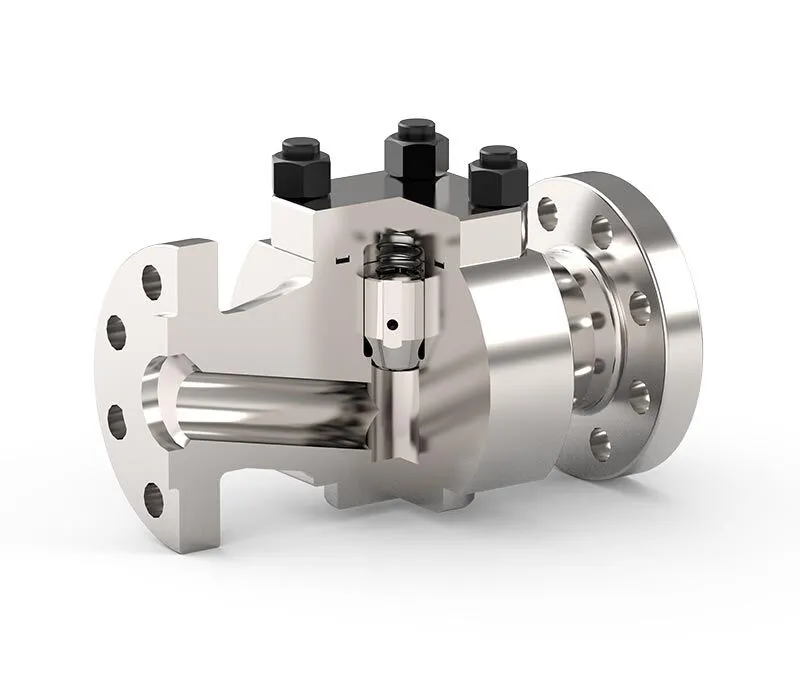Piston Check Valve: Precision Flow Control for High-Pressure Applications

In industries where high-pressure systems are involved, precise flow control is critical to ensuring efficiency, safety, and system longevity. Piston check valves are essential components in such applications, offering reliable and effective backflow prevention, along with superior performance under high-pressure conditions. This article explores the benefits, functionality, and applications of piston check valves, highlighting their role in optimizing flow control in demanding environments.
What is a Piston Check Valve?
A piston check valve is a type of check valve designed to allow fluid to flow in only one direction while preventing backflow in high-pressure systems. The valve features a piston mechanism that moves to control the flow of fluid. When the fluid flows in the correct direction, the piston is pushed open, allowing the fluid to pass through. If the flow reverses, the piston moves to block the passage, preventing backflow and protecting the system from potential damage.
Piston check valves are often used in applications where reliability, precision, and durability are essential, such as in hydraulic systems, oil and gas pipelines, and high-pressure water systems. These valves are highly effective in preventing issues like contamination, pressure surges, and equipment failure, making them crucial in a variety of industries.
How Piston Check Valves Work
- Flow Initiation: When fluid enters the valve from the inlet side, it pushes against the piston, causing it to move in the direction of the flow. This action opens the valve and allows the fluid to pass through the system without obstruction.
- Backflow Prevention: If the fluid flow is reversed, the piston is forced to seal off the passage, blocking the reverse flow and preventing backflow from entering the system. This is crucial in applications where even small amounts of backflow can cause contamination or equipment damage.
- Precision Flow Control: Piston check valves are designed to maintain precise flow control under high-pressure conditions. The piston is often equipped with seals or o-rings to ensure a tight seal and prevent leakage, which is especially important in systems where fluid pressure is high or fluctuating.
Key Benefits of Piston Check Valves
- High-Pressure Tolerance: One of the most notable advantages of piston check valves is their ability to function effectively under high-pressure conditions. The robust design of the piston and its sealing mechanisms ensures that the valve can withstand pressure surges without compromising its performance, making it ideal for demanding applications.
- Reliable Backflow Prevention: Piston check valves provide a reliable method of preventing backflow in high-pressure systems. This is essential in protecting critical equipment, such as pumps, compressors, and pipelines, from the harmful effects of reverse flow, which can lead to damage, contamination, or system failure.
- Smooth and Precise Operation: The piston mechanism ensures smooth operation with minimal resistance, allowing for efficient flow control. The precise sealing action of the valve helps prevent fluid leakage, ensuring that the system operates at optimal efficiency.
- Durability and Longevity: Constructed from high-quality materials such as stainless steel, bronze, or other corrosion-resistant alloys, piston check valves are built to withstand harsh conditions and provide long-term performance. Their ability to resist wear and tear over time makes them a cost-effective choice for high-pressure applications.
- Minimal Maintenance Requirements: Piston check valves are designed for durability and require minimal maintenance. Their simple yet effective design reduces the likelihood of failure, and when properly maintained, they can offer years of reliable service without the need for frequent repairs or replacements.
Applications of Piston Check Valves
- Hydraulic Systems: Piston check valves are commonly used in hydraulic systems to prevent backflow and protect pumps and actuators from damage. In hydraulic circuits, controlling the direction and flow of fluids is critical, and piston check valves provide the precision and reliability needed in these high-pressure systems.
- Oil and Gas Industry: In oil and gas pipelines, where high pressure and harsh conditions are the norm, piston check valves ensure that fluid flows in the correct direction while preventing reverse flow that could lead to contamination or pressure surges. These valves help maintain the integrity of pipelines, preventing damage to infrastructure.
- Water Treatment and Pumping Stations: Piston check valves are used in water treatment facilities and pumping stations to prevent backflow from contaminating clean water supplies. By maintaining one-way flow, they protect the system from contamination and help ensure the efficiency of water distribution systems.
- Industrial Process Systems: Many industrial process systems require high-pressure fluid flow control, and piston check valves are ideal for these applications. Whether in chemical processing, food and beverage production, or power generation, piston check valves provide the precision needed to maintain optimal flow rates and prevent backflow.
- Power Generation: In power plants, piston check valves are used to control the flow of water, steam, and other fluids under high-pressure conditions. Their reliability ensures that power generation systems operate without disruptions caused by reverse flow or contamination, making them an integral part of power plant infrastructure.
- Marine Applications: Piston check valves are used in marine systems to protect against backflow in high-pressure water and fuel systems. Their ability to handle the demanding conditions of marine environments makes them a popular choice for ships, offshore rigs, and other maritime operations.
Advantages Over Other Types of Check Valves
While there are several types of check valves available, piston check valves offer several advantages over others, such as ball, swing, or spring-loaded check valves, in high-pressure applications:
- Better Sealing: The piston provides a superior seal compared to other check valves, ensuring minimal leakage and better control over fluid flow. This is especially important in high-pressure systems where maintaining a tight seal is crucial.
- Enhanced Durability: Piston check valves are often made from more robust materials, making them more durable and resistant to wear, corrosion, and fatigue under high-pressure conditions. This gives them a longer service life compared to other types of check valves.
- Compact Design: Piston check valves often have a more compact design, which is advantageous in systems with limited space or where a smaller valve profile is required. This makes them suitable for applications where installation space is at a premium.
Conclusion
Piston check valves play a vital role in providing precision flow control and reliable backflow prevention in high-pressure systems. Their ability to withstand extreme conditions, combined with their smooth operation and minimal maintenance requirements, makes them an indispensable component in industries like oil and gas, hydraulics, water treatment, and power generation. By ensuring that fluid flows in one direction and preventing backflow, piston check valves protect sensitive equipment, improve system efficiency, and contribute to the longevity of high-pressure applications. Their robust design, durability, and superior sealing make them an essential choice for demanding industries.






